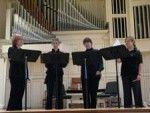Bringing Medieval Back

Last Sunday, November 9, an amazing metamorphosis took place on campus when the vocal group Anonymous 4 (A4) transformed the Colgate Memorial Chapel into a Benedictine monastery. Hailing mostly from New York City and named (tongue-in-cheek) after the famous French Medieval author, the four women of Anonymous 4 presented a lavish program incorporating works from medieval English chant and polyphony with early American spirituals. The crystal clear tone of the performers, beautiful mix of complex polyphonic motets and hymns with simple Gregorian chants and profusion of open fifths (something I’ve eagerly awaited all semester) could not possibly fail to inspire even the most inert audience members. And, as the concert came to a close, there were more than a few listeners woeful that they needed to leave the beautiful world Anonymous 4 constructed.
While A4 is famous within Medieval scholarly circles for their excellent interpretation of ancient manuscripts, it was the juxtaposition of Medieval with American folk traditions that was the major draw for concert-goers on Sunday. However, there was probably enough variety alone in the 13th century Ladymass (a special mass devoted to the Virgin Mary) that made up the first half of the concert.
Case in point was the lively song “Edi beo thu hevene quene,” written in Middle English. The harsh yet energetic language, coupled with the flowing musical lines, contrasted delightfully with monophonic Gregorian chants placed elsewhere within the Mass. Then there was the lilting “Conductus: Ave tuos benedic” which was sung in rhythmic unison (I was impressed at how precise all members of A4 were in their timings and cutoffs) with the hocket-ridden (hocket translated literally as “hiccup”) conclusion to the mass: “Ite, missa est.”
The most striking elements of Medieval music, however, are the totally foreign tonalities; foreign at least to the ears of people raised on Mozart and Metallica. Medieval music is rife with open and parallel fifths (translation: something centuries of foolish composers ever since have tried to banish from music). It was wonderful finally to be in a setting where my favorite type of harmony was acceptable; besides, it made the pervasive thirds (a.k.a. more traditional harmonies) in a couple of the later-Medieval styled movements stand out all the more.
The “Gloria” and “Sanctus” especially swept me up with their balance between thirds and fifths, but what sealed the deal was the ability of A4 to sing perfectly in tune; the pure harmonies brought out in both the fifths and thirds were transcendent, and the acoustic equivalent of getting a full body massage and eating foie gras (though maybe not at the same time).
Following the conclusion of the Ladymass, A4 moved forward a couple hundred years to sing music from the early American folk tradition. It was surprising that so much of this early American music sounded similar to the Medieval works: open fifths, sustained drone notes, a bit of polyphony (but not too much; early American composers weren’t well-trained, so they couldn’t handle complex musical ideas). Regardless, the music still had a unique character and variety, which the singers so expertly tapped. The fuging tune “Rainbow” exemplified this idea; the piece is sung in a polyphonic style on the sounds of the solfeggio (do, re, mi, and so forth — the syllables you learned in elementary school and probably never used again). The way A4 blended the parts into a unified whole, even while singing on the sounds “fa” and “la,” was delightful.
In addition to such warm and inviting folk songs, Anonymous 4 showed themselves equally adept at singing the sparse, haunting strains of the ballad “Wayfaring Stranger.” The Wood’s Tea Company sang the same tune last week in a concert of their own, and I was shocked at how A4 was able to present the song in such a different light (maybe it was the lack of a banjo).
However, the full force of Anonymous 4’s talent was realized when they sang the famous spiritual “Shall We Gather at the River.” From the first soulful note until the last sustained chord I was wrapped up in a contemplative reverie the likes of which I’ve never felt before as the voices of the performers gracefully flowed about me. If I harbored any last doubts that a group of four female singers wouldn’t have the emotional base and power of either the deeper male voice or nature’s perfect instrument (the French horn), they were swept away.
As much as I regretted it, Anonymous 4’s concert eventually drew to a close. The group did do one encore piece, a very short “Ite, missa est” from a Latin mass. While the selection drew some laughs from the crowd (it was the musical equivalent of a command in Latin to “get lost — the concert’s over”), in retrospect it was actually very appropriate.
Over the course of the afternoon, Anonymous 4 not only sang a collection of sacred music, but their amazing talent was akin to an actual religious experience. I was incredibly fortunate to have had the chance to enter A4’s world, and even though I needed to leave, their voices and message will follow me like the incense lingering after a service.






